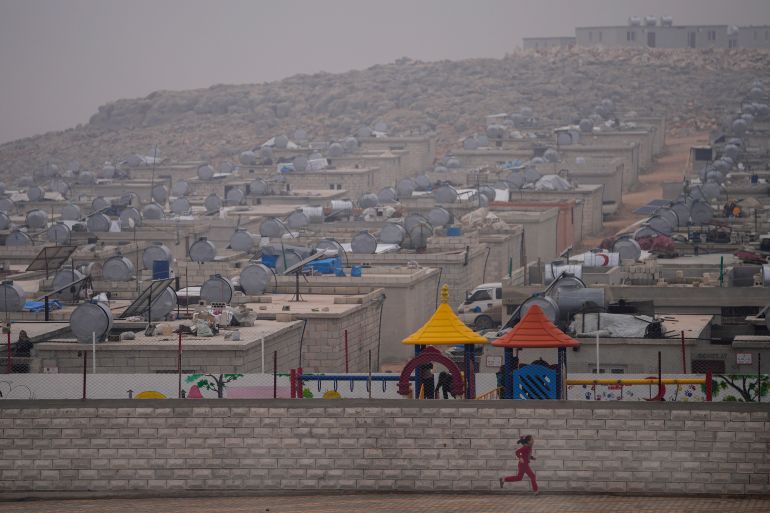Brussels conference: Donors pledge $6.7bn in aid for Syrians
International donors pledge $4.3bn for this year and $2.4bn ‘for 2023 and beyond’ to support war-wracked Syrians.

Beirut, Lebanon – International donors on Tuesday pledged $6.7bn to support war-torn Syria and neighbouring countries hosting millions of Syrian refugees amid the war in Ukraine and the global economy hit hard by the COVID-19 pandemic.
Donors at the sixth annual Brussels conference pledged $4.3bn for this year and $2.4bn “for 2023 and beyond”, while international financial institutions also pledged $1.8bn in loans. The UN had sought $10.5bn for 2022.
Keep reading
list of 3 itemsSix dead, 48 rescued as migrant boat capsizes off Lebanon
Saudi announces return of ambassador to Lebanon
European Commissioner Oliver Varhelyi said the pledge delivers a “very important political message for the entire region”.
“Despite all the war in Europe, despite the pandemic, donors are sending now a very strong signal to Syria and the region that we are ready to do even more than before for the peace of that country and to rebuild that country,” Varhelyi said.
The conference, attended by 55 countries and 22 international aid organisations, comes at a time when continuing donor fatigue has worsened due to the COVID-19 pandemic, the war in Ukraine, and their global economic impact.
Russia, a key actor in the Syrian conflict and ally of Syrian President Bashar al-Assad, was not invited to the conference due to its invasion of Ukraine in late February.
The pledges match that of last year, though demands have skyrocketed.
Head of Advocacy for the Middle East at Norwegian Refugee Council, Samah Hadid, said the international community “cannot be complacent”, as needs continue to skyrocket in Syria due to compounding crises.
“While the world looks away, humanitarian needs in Syria are skyrocketing,” Hadid told Al Jazeera. “Funding is needed but we also need long-term solutions to address multiple crises hitting the country.”
‘Not forgetting the Syrian people’
However, Josep Borrell, the EU’s foreign policy chief, said, “we are not forgetting the Syrian people”.
“Certainly, Syria and the suffering of its people might not be in the centre of the news any more. There is a certain fatigue after 11 years – but it remains on our minds.
“We want and we need to make sure that this situation remains high on the international agenda.”
A mass uprising in 2011 turned into a devastating war after the Assad regime carried out a brutal crackdown on peaceful protesters. The armed rebellion spread, bringing in foreign proxies, complicating the conflict in its 12th year.
An estimated 500,000 people have been killed, and nearly half of Syria’s pre-war population is displaced, with millions forced to flee to neighbouring countries. The UN estimates that 90 percent of Syria’s population lives in poverty, while 60 percent are at risk of going hungry.
Al-Assad remains entrenched in power with Russian and Iranian military support.
In the opposition-held enclave in Syria’s northwest, where the Turkish lira is the adopted currency, Ankara’s economic crisis has skyrocketed food and fuel prices.
About 97 percent of the four million people in northwest Syria live in poverty, where more than half are internally displaced.
Ten days ago, the UN World Food Programme reduced its life-saving food assistance to the region due to budget constraints and skyrocketing prices, further exacerbated by the conflict in Ukraine.
Meanwhile, in Damascus, the Syrian government slashed its budget from $9bn in 2020 to $5.3bn for 2022, and cut subsidies for bread, diesel, cooking gas, petrol, and other essential items for hundreds of thousands of people.
A big chunk of the money will go to help Syrians living in refugee camps in neighbouring Jordan, Lebanon and Turkey, which host large numbers of Syrian refugees and are struggling with donor fatigue and economic crises of their own.
NGOs in Lebanon like Sawa for Development and Aid are struggling to navigate through declining funding while fuel and food prices surge weekly.
“Refugees aren’t able to meet their daily needs, as well as the host communities,” the NGO’s founder and director Rouba Mhaissen told Al Jazeera.
“We are seeing a drop in donor funding when it comes to the Syrian crisis, yet we want to urge all donors to continue supporting the Syrian cause.”